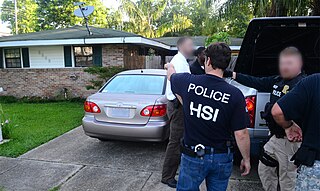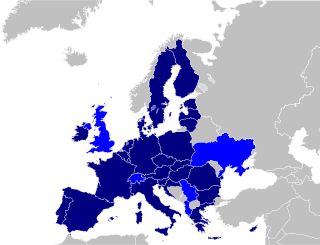
Juvenile delinquency, also known as "juvenile offending", is the act of participating in unlawful behavior as minors. Most legal systems prescribe specific procedures for dealing with juveniles, such as juvenile detention centers and courts, with it being common that juvenile systems are treated as civil cases instead of criminal, or a hybrid thereof to avoid certain requirements required for criminal cases. A juvenile delinquent in the United States is a person who is typically below 18 years of age and commits an act that otherwise would have been charged as a crime if they were an adult. Depending on the type and severity of the offense committed, it is possible for people under 18 to be charged and treated as adults.
A missing person is a person who has disappeared and whose status as alive or dead cannot be confirmed as their location and fate are not known.

The Office of Justice Programs (OJP) is an agency of the United States Department of Justice that focuses on crime prevention through research and development, assistance to state, local, and tribal criminal justice agencies, including law enforcement, corrections, and juvenile justice through grants and assistance to crime victims.

Internet Crimes Against Children (ICAC) is a task-force started by the United States Department of Justice's Office of Juvenile Justice and Delinquency Prevention (OJJDP) in 1998. Its primary goals are to provide state and local law enforcement agencies the tools to prevent Internet crimes against children by encouraging multi-jurisdictional cooperation, as well as educating law enforcement agents, parents, and teachers. The aims of ICAC task forces are to catch distributors of child pornography on the Internet, whether delivered on-line or solicited on-line and distributed through other channels and to catch sexual predators who solicit victims on the Internet through chat rooms, forums and other methods. Currently all fifty states participate in ICAC.

In criminal justice systems a youth detention center, also known as a juvenile detention center (JDC), juvenile detention, juvenile hall or more colloquially as juvie, is a prison for people under the age of majority, often termed juvenile delinquents, to which they have been sentenced and committed for a period of time, or detained on a short-term basis while awaiting trial or placement in a long-term care program. Juveniles go through a separate court system, the juvenile court, which sentences or commits juveniles to a certain program or facility.
The Juvenile Justice and Delinquency Prevention Act of 1974 is a United States federal law providing funds to states that follow a series of federal protections, known as the "core protections," on the care and treatment of youth in the justice system. The four "core protections" of the act are:
John J. Dilulio Jr. is an American political scientist. He currently serves as the Frederic Fox Leadership Professor of Politics, Religion, and Civil Society and Professor of Political Science at the University of Pennsylvania.
Crime in the United States has been recorded since colonization. Crime rates have varied over time, with a sharp rise after 1963, reaching a broad peak between the 1970s and early 1990s. Since then, crime has declined significantly in the United States, and current crime rates are approximately the same as those of the 1960s.

The United States Bureau of Justice Statistics (BJS) is a federal government agency belonging to the U.S. Department of Justice and a principal agency of the U.S. Federal Statistical System. Established on 27 December 1979, the bureau collects, analyzes and publishes data relating to crime in the United States. The agency publishes data regarding statistics gathered from the roughly fifty-thousand agencies that comprise the U.S. justice system on its Web site.
To collect, analyze, publish, and disseminate information on crime, criminal offenders, victims of crime, and the operation of justice systems at all levels of government. These data are critical to Federal, State, and local policymakers in combating crime and ensuring that justice is both efficient and evenhanded.
Reclaiming Futures is a non-profit organization aimed at assisting teenagers out of trouble with drugs, alcohol and crime. It began in 2001 with $21 million from The Robert Wood Johnson Foundation. As of 2010 it operates with funding from the Robert Wood Johnson Foundation, the U.S. Office of Juvenile Justice and Delinquency Prevention (OJJDP), the Center for Substance Abuse Treatment and the Kate B. Reynolds Charitable Trust. As of 2010 the group is based at the Regional Research Institute for Human Services of the Graduate School of Social Work at Portland State University in the United States, and operates in 26 communities across the U.S.

Take Root, a non-profit organization established on a grant from the United States Department of Justice, was the first missing-child organization to be founded by former abducted children. Founded in 2003 as a program under the auspices of the Association of Missing & Exploited Children's Organizations and independently incorporated as a 501(c)(3) in 2005, Take Root had over five hundred former abducted children participate in its ground-breaking peer support program for former abducted children, creating an unprecedented knowledge and database used by its Child Abduction Studies branch to develop multidisciplinary training, case consultation, and policy recommendations. The agency's mission is to "insert the voice of the primary victim into public and policy discussions on child abduction, using the collected wisdom of former victims to improve America's missing-child response." Their tags-line are "beyond recovering missing-children; to helping missing-children recover" and, "where missing children are seen and heard." Take Root was the brain child of Melissa "Liss" Haviv, a Fulbright Scholar in cultural anthropology touted by NPR as a leading expert in the victimology of long term child abduction
This page is primarily concerned with juvenile delinquency in the United States..For information on juvenile delinquency in general, see juvenile delinquency. In addition, although the term juvenile delinquency often refers to juvenile as both the victims and the aggressors, this page only refers to juveniles as the actual delinquents. The information and statistics for juveniles as victims rather than offenders is much different. For information about juveniles as the victims of violent attacks, see trafficking of children, child abuse, child sexual abuse, or prostitution of children.
The National Gang Center (NGC) is a coordinated project of three federal agencies, the Office of Justice Programs (OJP), Bureau of Justice Assistance (BJA) and the Office of Juvenile Justice and Delinquency Prevention (OJJDP).
Child abduction or child theft is the unauthorized removal of a minor from the custody of the child's natural parents or legally appointed guardians.

116 000 is the European missing children hotline number. It was the first harmonised service of social value to be adopted by the European Union. The 116 000 hotline provides free, immediate life saving support when children go missing.

The United States incarcerates more of its youth than any other country in the world through the juvenile courts and the adult criminal justice system, which reflects the larger trends in incarceration practices in the United States. In 2010, approximately 70,800 juveniles were incarcerated in youth detention facilities alone. Approximately 500,000 youth are brought to detention centers in a given year. This data does not reflect juveniles tried as adults. Around 40% are incarcerated in privatized, for-profit facilities.
As of August 2017 Jerry Regier is the Deputy Assistant Secretary for Human Services Policy in the U.S. Department of Health and Human Services. He provides leadership on policy analysis and development in human services and on research under the Assistant Secretary for Planning and Evaluation (ASPE) for Secretary Mike Leavitt.

The Missing Children's Assistance Reauthorization Act of 2013 is a bill that was introduced into the United States House of Representatives during the 113th United States Congress. The Missing Children's Assistance Reauthorization Act of 2013 reauthorizes the Missing Children's Assistance Act and authorizes $40 million a year to fund the National Center for Missing and Exploited Children.

Gender responsive approach for girls in the juvenile justice system represents an emerging trend in communities and courts throughout the United States, Australia and Latin America, as an increasing number of girls are entering the juvenile justice system. A gender responsive approach within the juvenile justice system emphasizes considering the unique circumstances and needs of females when designing juvenile justice system structures, policies, and procedures.










